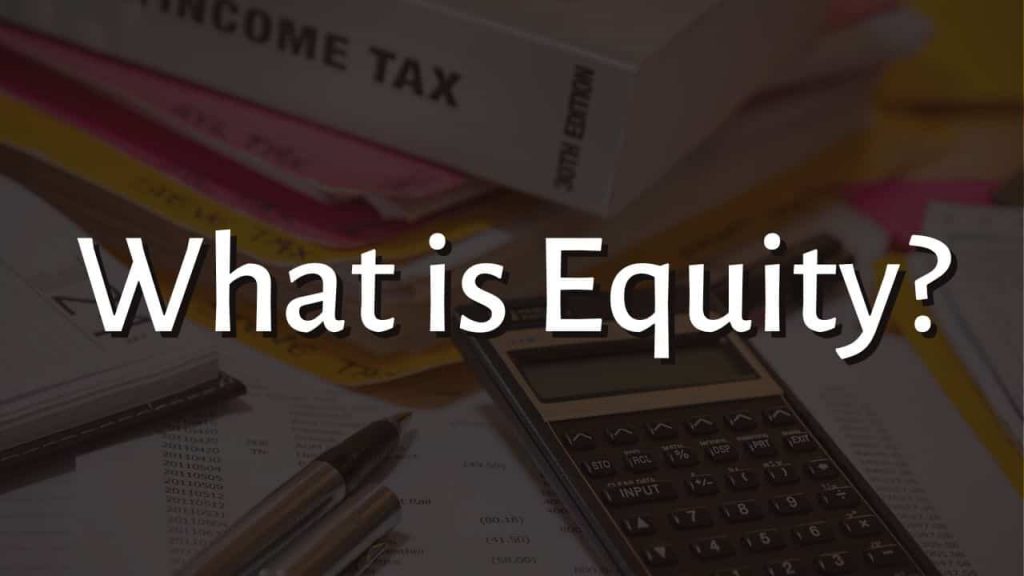What is Equity?
Equity is the amount of capital invested or owned by a company’s owner. Equity is calculated as the difference between a company’s liabilities and assets on its balance sheet. The current share price or a value assigned by valuation professionals or investors determines the worth of the stock. This is also known as owner’s, stockholder’s, or shareholder’s equity.
In general, there are two types of equity value:
- Market value
Book Value
Equity is always recorded at its book value in accounting. This is the value determined by accountants through the preparation of financial accounts and the balance sheet equation:
Assets = liabilities + equity
The equation may be rewritten as:
Equity = assets – liabilities
The sum of a company’s current and non-current assets on the balance sheet equals the value of its assets. Cash, accounts receivable, inventories, prepaid costs, fixed assets, property plant and equipment (PP&E), goodwill, intellectual property, and intangible assets are the most important asset accounts.
Liabilities are the total of all current and non-current liabilities on the balance sheet. Lines of credit, accounts payable, short-term debt, deferred revenue, long-term debt, capital leases, and any fixed financial commitment are examples of common liability accounts.
In reality, the value of equity is computed considerably more precisely and is based on the following accounts:
- Share capital
- Surplus contributed
- Retained earnings
- Net Profit (loss)
- Dividends
Accountants must track all capital raised and repurchased by the firm (its share capital), as well as its retained earnings, which are calculated as cumulative net income minus cumulative dividends. Equity is equal to the sum of share capital and retained earnings.
Market Value
Equity is often stated in finance as a market value, which may be significantly greater or lower than the book value. Accounting statements are backwards-looking (all outcomes are from the past), but financial analysts look ahead, to the future, to estimate what they feel financial performance will be.
If a corporation is publicly traded, calculating the market value of its equity is simple. It’s just the most recent share price multiplied by the total number of outstanding shares.
When a firm is private, determining its market value is significantly more difficult. If the company has to be formally evaluated, it will frequently employ professionals to do a detailed examination, such as investment bankers, accounting companies (valuations group), or boutique valuation firms. Professionals will utilize a variety of methodologies to calculate this equity value, including:
- Precedent transactions
- Comparable company analysis
- Discounted cash flow analysis
Personal Equity in Accounting
In accounting, equity may also refer to an individual’s personal equity, or net wealth. Individuals, like businesses, can calculate their personal equity by subtracting the entire value of liabilities from the total value of assets. Personal assets will include cash, investments, property investment, and automobiles. Personal liabilities often include credit lines, current obligations, unpaid payments, and mortgages.
What Is the Process of Equity Financing?
Equity financing is a means of obtaining funds for a company through investor contributions (s). In exchange for money, the company gives away a portion of its ownership, usually a proportion of its shares.
For an investor and a business owner, equity financing may provide both benefits and hazards.
Because the corporation does not repay the investor’s money, the investor is taking a risk. Rather, the investor now has a greater share of the earnings (because he now owns more of the company). This indicates that an investor’s earnings may grow significantly over time. However, if the business fails, the investor may lose everything.
The business owner may now have the funds to pursue his ambitions. However, depending on the amount of ownership given, decisions about how the company is operated may now have to be shared. Relationships may suffer.
It is not unusual for a company to raise many rounds of equity funding in order to grow and achieve its objectives.
We also have:
Generally Accepted Accounting Principles (GAAP)
For more click here and if you are looking for full forms of different acronyms and words then check out this list you really gonna find this helpful. We also have an Essay on every topic, Check the complete list here. If you are Studying in Matric Free Video Lectures of Maths, Physics and English are here, and we have got you covered for I.COM Business Maths also.







